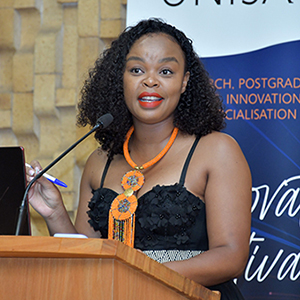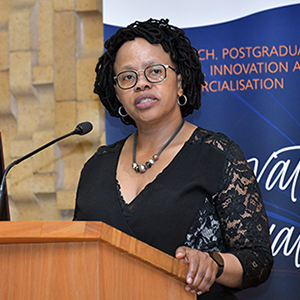News & Media
Accelerating innovation and technology impact to enhance development

Noxolo Fani
Officially opened on 29 November 2023, the 2023 Unisa Innovation Festival, co-hosted by the Directorate of Innovation, Technology Transfer and Commercialisation (DITTC), and the Colleges of Graduate Studies; Science, Engineering and Technology; and Agriculture and Environmental Sciences, provided participants with the opportunity to learn about the latest innovation trends at the university, discuss broad trends in innovation, research and collaboration, and build partnerships within the innovation ecosystem. The festival is held from 27 November to 1 December 2023, and this year’s theme is "The future of innovation: accelerating impact through collaboration".
Officially opening the festival, Noxolo Fani, programme director and Chief Executive Officer of Phenomenal Light Construction Creators and Platform Excel, said: "This festival is an intersection where ideas collide, and solutions are born. Let us collaborate to spark transformation, learn, explore and inspire each other to redefine the innovation boundaries." Fani also emphasised that innovation gaps must be addressed to ensure that no one is left behind.
Ensuring that innovation does not remain an elusive dream

Prof Thenjiwe Meyiwa
Prof Thenjiwe Meyiwa, Unisa’s Vice-Principal of Research, Postgraduate Studies, Innovation and Commercialisation, provided the context of the festival, and remarked: "This event celebrates creativity, intellect and transformative ideas that can shape the future, and it reaffirms the role that higher education institutions should play in South Africa’s socioeconomic development." She added: "It further showcases the Unisa community’s ground-breaking innovations." Meyiwa also explained that the value of inventions lies in their implementation and utility and in addressing challenges for which they were initially conceived. She continued that without human creativity and absorptive capacity, innovation remains an elusive dream.
Meyiwa further said: "As we strive towards a knowledge-based society and grappling with the impacts of artificial intelligence and machine learning, a multi-disciplinary approach is paramount." Speaking about Unisa’s commitment to research and development, Meyiwa asserted that Unisa is among the largest producers of master’s and doctoral graduates; therefore, it contributes to the African continent’s innovative and absorptive capacity. She continued: "Unisa’s research outputs have surged over the last ten years with intellectual property protection through the DITTC, which supports innovators through funding, awareness programmes and provides avenues to showcase their innovations." Meyiwa further noted that the university aims to intensify societal impact through innovation and that can be achieved through collaborative support and cooperation.
Challenges of a world in transition
Keynote speaker, Dr Mlungisi Cele, Chief Executive Officer of the National Advisory Council on Innovation, stated that the world is characterised by geopolitical crisis, it is transitioning and is in a polycrisis state. He also argued that factors such as climate change, unemployment, poverty and inequality contribute to these crises. He added: "The COVID-19 pandemic has stretched the national innovation system to the limits and challenged its resilience, consequently, we are dealing with the pandemic’s impacts such as budget cuts by government."
Cele also emphasised that transition in areas such as health, education and energy should be just and inclusive. He also encouraged Unisa to assist marginalised communities such as rural-based citizens to ensure that they benefit from the transition. Additionally, Cele encouraged higher education institutions to produce research that addresses societal challenges, positively impacting communities and enhancing development.
According to Cele, some of South Africa’s challenges are due to decision-making made by government across all levels that is not informed by evidence and research. He affirmed that the country should embrace innovation and digitise its systems. He also urged higher education institutions to produce research that can help in decision-making and to attract young researchers. Commending universities on their support for especially female researchers to produce more research publications, Cele moreover urged them to advance research collaboration and improve their research patents’ production globally.
Cele noted: "As much as innovation is important and assistive, but it promotes inequality such as digital divide, and this dynamic should be addressed." He also stressed: "The misuse of generative artificial intelligence such as cybercrime and creating fake news must be tackled. At the national government level, we are developing a national strategy on cyber security that is informed by research and development." Cele concluded: "Let us remain positive and promote innovation while addressing its negative impacts."
The festival also featured a robust panel discussion by leading industry partners, funders, government and other higher education institutions, focusing on "From white paper to socioeconomic impact – the continuing role of higher education institutions". Further, start-up innovators presented their pitches and received feedback and guidance from leading industry judges.
Watch a video recording of the 2023 Unisa Innovation Festival here.
#Unisa150
* By Nancy Legodi, Acting Senior Journalist, Department of Institutional Advancement
** Photography by Shooheima Champion, Unisa Multimedia Centre
Publish date: 2023/11/30

 Unisa co-hosts G20 community outreach in the Eastern Cape
Unisa co-hosts G20 community outreach in the Eastern Cape
 Unisans gain membership of prestigious science academies
Unisans gain membership of prestigious science academies
 Advocating for disability transformation through servant leadership
Advocating for disability transformation through servant leadership
 Unisa Press continues to illuminate the publishing space
Unisa Press continues to illuminate the publishing space